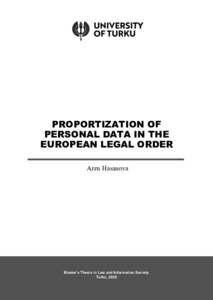PROPORTIZATION OF PERSONAL DATA IN THE EUROPEAN LEGAL ORDER
Hasanova, Arzu (2020-11-17)
PROPORTIZATION OF PERSONAL DATA IN THE EUROPEAN LEGAL ORDER
Hasanova, Arzu
(17.11.2020)
Julkaisu on tekijänoikeussäännösten alainen. Teosta voi lukea ja tulostaa henkilökohtaista käyttöä varten. Käyttö kaupallisiin tarkoituksiin on kielletty.
avoin
Julkaisun pysyvä osoite on:
https://urn.fi/URN:NBN:fi-fe20201217101270
https://urn.fi/URN:NBN:fi-fe20201217101270
Tiivistelmä
The GDPR, applied since 2018, has largely filled the gaps and shortcomings in personal data
protection that existed under the 1995 Directive. However, additional measures are still needed to further
harmonize the protection of personal data, as well as to correct the imbalance of power between data
subjects and controllers.
One of the options for providing real control of data subjects over personal data is a property regime,
which by its nature implies the most complete right that has a binding effect on any third parties. The
proportization approach was developed in American doctrine as an alternative to the tort system with
limited application, and as a way to avoid a biased legislative process that reflected primarily the
interests of lobbying companies.
This study provides an in-depth analysis of the control tools that are already applied in the EU legal
system. These tools are compared with the objectives of the Regulation and the prospects for their
achievement by the already available mechanisms. It is done to assess how if property regime on
personal data can provide something valuable for personal data protection purposes and if the property
regime is (in)capable of resolving the set objectives in the context of the European legal order.
protection that existed under the 1995 Directive. However, additional measures are still needed to further
harmonize the protection of personal data, as well as to correct the imbalance of power between data
subjects and controllers.
One of the options for providing real control of data subjects over personal data is a property regime,
which by its nature implies the most complete right that has a binding effect on any third parties. The
proportization approach was developed in American doctrine as an alternative to the tort system with
limited application, and as a way to avoid a biased legislative process that reflected primarily the
interests of lobbying companies.
This study provides an in-depth analysis of the control tools that are already applied in the EU legal
system. These tools are compared with the objectives of the Regulation and the prospects for their
achievement by the already available mechanisms. It is done to assess how if property regime on
personal data can provide something valuable for personal data protection purposes and if the property
regime is (in)capable of resolving the set objectives in the context of the European legal order.
